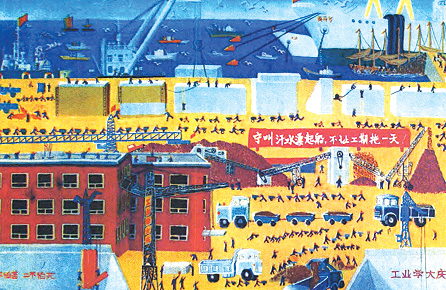
For readers interested in a little background on this month’s cover story:
I first began to develop an interest in the oil of Iraq in 2003. It was the war that drew me in, of course, but not for the usual reasons. The fact of the matter is that, like most Americans, I never really had to cope with the consequences of this or any other war. (I don’t consider 9/11 a military event.) What I did have to cope with was a failing American discourse. The debate about the war, such as it was, did not seem to be grounded in any kind of real facts about our putative enemy, and it was this increasing unreality here at home that drove my interest in the oil in Iraq.
For most Americans, the war is little more than an idea and an image, and ideas and images are easy to manipulate. Indeed, whether or not the war is “about the oil” is a conceptual matter. But the oil itself remains indisputably real. Iraq has 115 billion barrels of proven reserves (and probably more than that yet to be discovered) and more than half its daily output eventually makes its way to the United States. Oil income (and foreign aid) is almost the entire basis for its federal budget. My hope, therefore, was that by traveling with the Army Corps of Engineers as they repaired the oil infrastructure of southern Iraq, I could better understand what was happening—actually happening—in Iraq and thereby arrive at some sort of rationally informed understanding of what my own country should do next.
Following the oil back to its source is easier than you might think, but it still requires a certain amount of perverse ambition. If you managed to secure an Iraqi visa and rent a car at the Kuwaiti border, you could drive up into one of the major oil fields in a matter of hours. But nobody does that. As retired Army General Barry McCaffrey reported early in 2007, “No Iraqi government official, coalition soldier, diplomat, reporter, foreign NGO, nor contractor can walk the streets of Baghdad, nor Mosul, nor Kirkuk, nor Basra, nor Tikrit, nor Najaf, nor Ramadi, without heavily armed protection.” Unless you could afford to hire such protection, at a cost of about $40,000 a day, you would have to rely on U.S. taxpayer–funded facilities—public transport, so to speak—and to do that, you would have to do what I ended up doing, which is taking a commercial flight to Kuwait ($1,029.21 on British Airways) and then hitching a ride on an Army C-130 cargo plane up to Baghdad, where, once you had signed a release, maybe you could go back south or maybe not, depending on events.
I did make it back south, and the engineers I met were unbelievably engaged and helpful. As I learned more about their work, though, I realized that I was increasingly unsure of anything. The concrete, discrete facts of Iraq—the difficulty of getting from one place to the next, the constant violence, the sheer size of the occupation—were easy enough to grasp, but it turned out that there was an extraordinarily large amount of such facts. The complexity of the situation in Iraq is overwhelming, and the time I spent with engineers made me realize all the more how much the war requires not big ideas but practical, informed judgment. There is no option at this point that could not be made worse through mismanagement. Even a rapid withdrawal, which I continue to believe is the least bad option for Americans and Iraqis alike, could, if handled incorrectly, lead to an even worse outcome.
A final thought: I taught English in Korea years ago, and one of my colleagues got severe food poisoning. The students attempted a folk cure on him. They beat his back and they beat his shoulders and they squeezed his arms. They squeezed from the top of the arm down to the elbow and then from the elbow to the wrists, as if his arms were udders full of poison. And what made this, in their minds, an effective exercise is that they had also pricked a hole in his thumb and they had hoped to literally squeeze the poison out of him. They said that they would know they had cured him when the blood that come out of his thumb was no longer red but black. Every single one of their assumptions was incorrect. My friend only added several dark bruises to his list of injuries.
Extraction is a far more complex matter in Iraq. But getting the oil out is by no means the same as getting the colonial and partisan poison out. That will remain long after the beating stops.



























































































